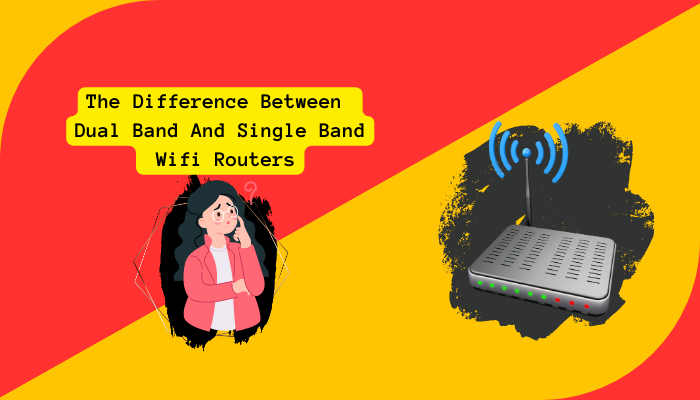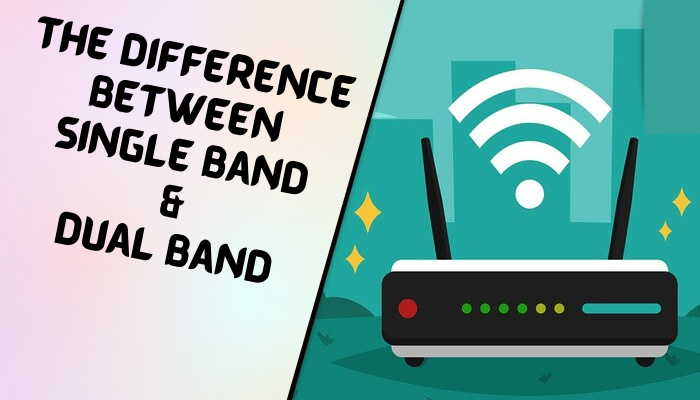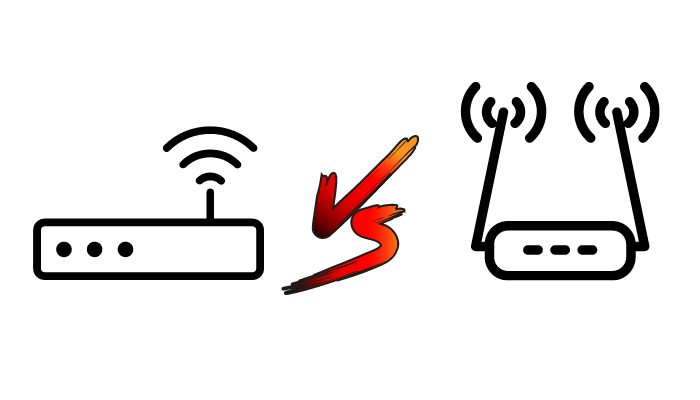The difference Between Dual Band and Single Band Wifi Routers greatly impacts our daily lives as they solely drive the quality of our WiFi connections. Considering that most of the work, be it at the office or at home, is done in the presence of WiFi, it is essential to choose the correct router.

Generally, there are two types of routers: one is a single-band router, and the other is a dual-band router. Choosing between them often brings a lot of confusion because both have pros and cons. If you are one of those confused people who cannot choose between the two, our article is perfect for you.
In this article, we will explain all the details of both routers and mention their advantages and disadvantages so you can choose the best one for your needs. So let us start learning the difference between dual-band and single-band WiFi routers.
What Is A Single-Band WiFi Router?
The 2.4GHz frequency range is often associated with the single-band router. When purchasing a single-band router, look for “2.4GHz frequency” in the specifications.
Compared to dual-band routers, single-band routers often have poor signals and cover only a narrow region. A single-band router should be your first pick if you have a tiny house or office and only have a few devices. A single-band router (2.4GHz) is sufficient for web browsing, emailing, and viewing movies.
A single-band router may not satisfy your requirements for tasks requiring higher bandwidth. Single-band routers are available at a low cost, with prices starting at around Rs. 800 only.
The single-band router is called Wireless-N, which supports only one frequency band. Technically, a single-band router can offer a speed of 800 Mbps, but it is subject to your internet service provider.
Features Of A Single Band Router:
Antennas are associated with better signal directionality and optimum speeds. A single-band WiFi router has only one antenna, so it has less bandwidth than routers with multiple antennas.
Single-band routers use a lower frequency on the 2.4GHz band, which has fewer channels and is thus more congested.
Most domestic equipment works on this frequency, including your microwave, mobile phone, and Bluetooth devices.
Single-band routers use the 802.11g standard, launched in 2003 by the Institute of Electrical and Electronics Engineers (IEEE), and limit transmission throughput to 54 Mbps. Still, the theoretical speed of single-band routers is 800 Mbps.
Theoretical because, due to technological bars like internet providers and other factors, the speed of the single-band router will never go up to 800 MBps.
They are economical and best suited for small rooms, as the signal faces numerous obstructions while transmitting.
Advantages Of Single Band Router:
The most important aspect of any router is its compatibility. Some devices are incompatible with the 5GHz frequency, whereas most are compatible with the 2.4GHz frequency band. So, we can say that the single-band router is compatible with most wireless cards and receivers.
A single-band router has a limited range and insufficient signal power, which makes it ideal for folks who want to use an app to browse the web, check their emails, and view movies. Moreover, it is economical and easily accessible in the market.
You can get yourself a single band WiFi router for under Rs. 1000. In fact, the single band routers start from as low as Rs. 700 and can go up to Rs. 2500. So, it is very cheap and will perfectly suit your small home.
What Is A Dual Band WiFi Router?
As the name implies, a dual-band router sends wireless signals on two frequency bands (2.4GHz and 5GHz). Dual-band routers give you greater options for how you connect to the internet because they use two bands.
Because more devices connect to the 2.4GHz band, you’ll likely see slower internet connections and more interference.
If you reside in a densely populated area, this is especially true. As a result, this band has fewer connections, meaning quicker internet speeds.
On the other hand, the 5GHz band allows you to have stronger signal strength, but it does not have a larger coverage area like the 2.4GHz band.
Dual-band routers divide your internet traffic between these two bands, increasing speed and dependability.
Most modern devices are compatible with the 5GHz band, but older models may have to connect to the 2.4GHz. But this is not an issue for the Dual band WiFi router as it transmits both frequencies simultaneously.
Features Of A Dual Band Router:
Many antennas create multiple streams for transferring data over radio channels, giving your devices extra bandwidth. The dual-band WiFi router has two antennas, so it operates on two bandwidths. As mentioned above, both the 2.4GHz and 5GHz bands are supported by dual-band routers.
The 5GHz spectrum can provide more data at quicker rates, but it has trouble traveling around walls and furniture and can’t travel as far.
The dual-band router operates on the newer 802.11ac standard. Because it uses both the 5GHz and 2.4GHz bands, this standard is speedier and sends more data.
Some dual-band routers come with extra features unavailable on previous models. Many, for example, feature MU-MIMO technology, which increases your WiFi’s interaction with many devices.
Routers without MU-MIMO can only focus on one device at a time, but MU-MIMO allows you to connect to numerous devices simultaneously.
Dual-band routers are generally a little more expensive, but that is only fair, given the number of features they offer.
Moreover, they cater to the needs of many devices and are seldom affected by obstructions because they have better penetration capabilities than single-band routers.
Advantages Of A Dual Band Router:
With a dual-band WiFi router, you can browse the internet or play games with minimal interruption because traffic is distributed among several paths. As a result, you’ll find that dual-band routers offer excellent performance in speed and dependability.
This router gives you more flexibility because some devices are on the 2.4GHz network while others are on the 5GHz network. Each network usage might have a speed limit specified as per the user.
Users can also connect to their desired network based on their needs. For example, for video streaming and online gaming, the 5GHz network is recommended.
Other electrical devices that use the 2.4GHz frequency, such as microwaves, Bluetooth, and cordless phones, do not interfere with the dual-band router signal. This means that devices will not get disconnected very often.
Dual-band routers are a perfect buy if you are a working professional or a gamer because you can switch to higher bandwidth and lower traffic anytime. But it is suitable for daily usage like surfing, emailing, etc.
What Is The Difference Between A Dual Band And A Single Band WiFi Router?
The difference between a single-band WiFi router and a dual-band WiFi router is mainly the frequency bands. In a single-band router, only one frequency band operates at 2.4GHz. Whereas in a dual-band router, two frequency bands are present.

One operates at 2.4GHz and the other at 5GHz. Consequently, users will have the option to switch between the two bands according to their needs. Moreover, unlike single-band routers, dual-band routers do not interfere with devices like microwave ovens, mobile phones, and Bluetooth.
Hence, the connection is very smooth, and devices seldom get disconnected. Dual-band routers have a larger coverage area and lesser penetration capability so the internet strength remains unwavering.
But, single-band routers can be used in small rooms because of their lower penetration capability. Single-band routers are economical, whereas dual-band routers are a bit pricey. But again, dual-band routers can be used for streaming video and gaming.
Dual Band Router Vs Single Band Router: Performance

A single-band router has a limited range and insufficient signal power. It’s ideal for folks who want to use an app to browse the web, check their emails, and view movies. But a dual-band router has a long range and a stronger signal, and it can switch between the bands automatically as needed.
Because of its robust signal, the dual-band router is perfect for online high-resolution gaming, video streaming, and high-resolution music.
A single-band router’s speed is restricted by the internet connection and the router’s speed. As a result, the user may experience frequent connection problems or interference, reducing Wi-Fi speed and stability. Whereas dual-band routers use both 2.4GHz and 5GHz bands, allowing for higher speeds and greater versatility.
As a result, the dual-band router eliminates connection difficulties and interference while increasing stability. Dual-band routers outdo single-band routers in terms of performance.
Dual Band Router Vs. Single Band Router: Pros And Cons
Single Band WiFi Router:
Dual Band WiFi Router:
Are Dual Band Wifi Routers Better?
- Dual-band Wi-Fi routers are generally better than single-band routers because they offer 2.4 GHz and 5 GHz bands.
- The 2.4 GHz band has a longer range and can penetrate through walls and other obstacles better than the 5 GHz bands.
- However, the 2.4 GHz band is more crowded and interferes with wireless devices like microwaves and cordless phones.
- The 5 GHz band is less crowded, faster, and more reliable for streaming high-bandwidth content like HD videos and online gaming.
- Dual-band routers allow users to switch between the 2.4 GHz and 5 GHz bands depending on their needs and the location of their devices.
This helps to ensure the best possible performance and connectivity.
FAQs:
Yes, in terms of stability and performance, the dual-band router outperforms the single-band router. However, they may be a little pricey compared to single-band routers.
Compared to triple-band routers, they may be slower. But they are faster compared to single-band routers. Since they operate on the 802.11ac standard, they can theoretically scale up to 2167 Mbps.
A dual-band supports the 5GHz frequency band, which provides fast internet speed but is accessible to a smaller area. The dual-band router can offer a speed of up to 2167 Mbps, which is theoretical as many factors decrease the router’s efficiency.
You can connect up to 32 devices to 5GHz WiFi simultaneously, although this depends on your router. Some routers can support over 250 devices, which is only theoretical. Practically, the number is quite lower.
Yes, connecting too many devices to your router will decrease internet speed.
Conclusion:
We hope you have now understood the major differences between the single-band router and the dual-band router. However, both have their own set of advantages and disadvantages. The single-band router is enough for minimal needs like surfing the web or watching YouTube.
However, to meet your high-end requirements like video streaming, and gaming, a dual-band router will perfectly meet your needs. The point is that the best router for you depends on your requirements.
Also Check: Big Billion day 2022 Wifi Router Offers

Hi, this is Kavya Ganesh working as an assistant professor in the electrical department at Anna University. In addition to my full time profession as a professor, I’m also a writer for websites and blogs in the electronics and wireless niches.
